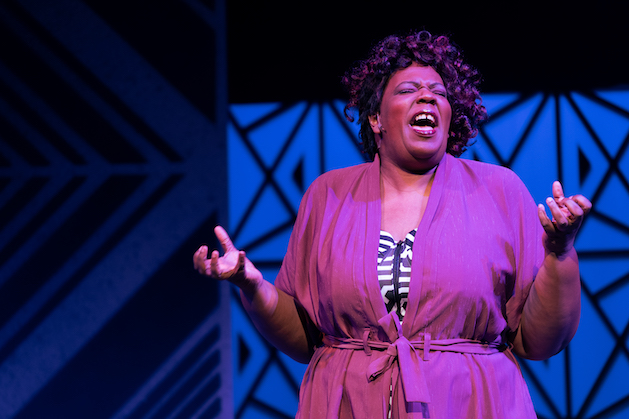
Playing Novelette, Alana Bridgewater anchors this production —
but the script doesn’t bother to give her a story.
(Photo: Moonrider Productions)
There are reviews I’ve been more eager to write. ‘Da Kink in my Hair is almost entirely about the experience of Black Canadian women. I’m a white guy — and I don’t think this musical is well constructed. So boo hoo me; or shut up me: I get the legitimacy of both responses. But I’ve been invited to review this show and I’m going to do it because I think the artistic discussion is worth having.
There is no overarching plot in ‘da Kink in my Hair, which is set in Novelette’s hair salon, which seems to be in Toronto. A series of women sit in Novelette’s chair, and she intuits their traumas and life crises by touching their hair. This triggers a monologue — in song and/or prose — from each of them and Novelette brings closure through forgiveness, inclusion, compassion, or solidarity.
Trey Anthony’s script brings up all sorts of issues: the murder of young Black men, the pressure on Black women to be perfect, colourism, sexual abuse … The list goes on. Obviously, every one of these issues is worth exploring. My argument is that they’re worth exploring in more depth.
In ‘da Kink, a religious woman named Patsy, for instance, tells us about the shooting death of her son, Jerome — but she gives us no context. We don’t even know who shot him, and surely that matters. Not that Jerome’s murder would ever by justified but, by keeping the circumstances generic, playwright Anthony reduces the death to a trope. This happens again and again.
The characters’ crises are predictable: “That woman is going to come out as lesbian. That girl is going to be sexually abused.” And the instant resolutions of the characters’ crises are both repetitive and suspect. (Nobody in the salon has an issue with the lesbian? Nobody?) I understand that Novelette’s salon is a fantasy of a perfect community, and we all need to be reassured — not to mention entertained; I’m just arguing that the experience could be richer.
There’s no present-time narrative in the salon itself — the characters tell their individual stories, but they barely relate to one another in real time — and that means that the ending feels arbitrary. There hasn’t been a focused accumulation of meaning.
‘Da Kink has a long lineage: it first emerged as a Toronto Fringe play (without music) in 2001. I can understand that, in earlier incarnations of the piece, simply raising some of its issues might have been ground-breaking, but the public discussion about Black female experience has become much more nuanced since then.
All of that said, there’s some significant talent on the stage. Ghislaine Doté plays a successful financier named Sherelle who feels herself crumbling — disappearing, she says, losing her digits and limbs — because of the expectations others have of her caretaking. Doté delivers the evening’s subtlest monologue with a combination of depth and restraint that makes it moving. And, playing one of the gals who’s hanging around the salon, she’s a terrific dancer and consistently charismatic presence.
Speaking of double casting, Tama Martin also pulls off a neat trick. As a sexually sassy young woman in the salon, she displays her talents as a dancer and comedienne. In fact, she makes such a strong impression that, when she reappeared as a girl named Stacey-Ann, it took me minutes to recognize her as the same performer.
Jenni Burke is charm — and confidence — personified as Miss Enid, an older woman with a tale of sexual adventure. And, Paige Fraser, the only white woman in the company, hits a homer in another of the evening’s more complex speeches.
Anthony’s songs aren’t particularly memorable. Nor was the evening as a whole for me. Other people are loving it.
‘DA KINK IN MY HAIR By Trey Anthony. Directed by Ray Hogg. An Arts Club Theatre production at the Stanley Industrial Alliance Stage on Thursday, April 21. Continues until May 15. Tickets
NEVER MISS A REVIEW: Sign up for FRESH SHEET, my weekly e-letter about the arts.
And, if you want to help to keep independent arts criticism alive in Vancouver, check out my Patreon page.





An amazing play